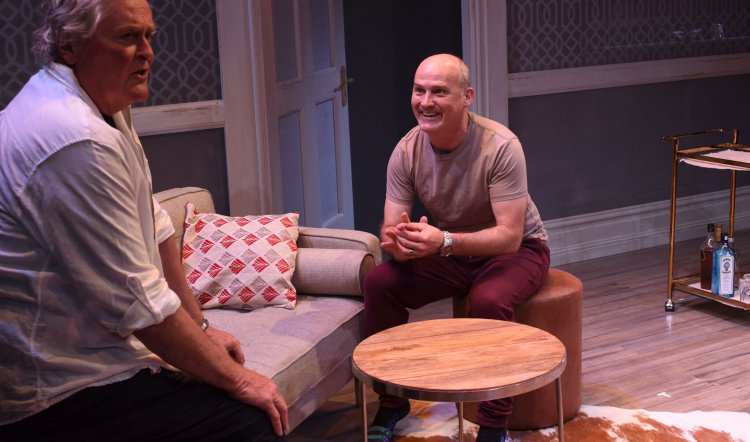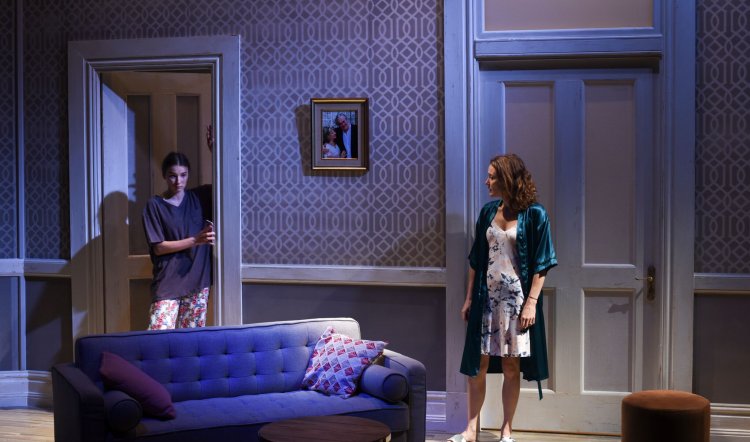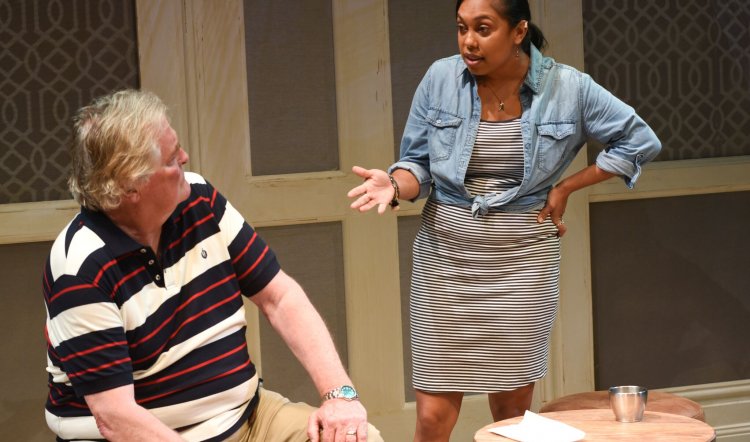
SORTING OUT RACHEL
SORTING OUT RACHEL, Ensemble Theatre, 24 January-17 March 2018. Photography by Heidrun Lohr: above - John Howard and Glenn Hazeldine; below - Jenna Owen and Natalie Saleeba; below again - John Howard and Chenoa Deemal
Director Nadia Tass mentions “issues” ten times in her short program notes for David Williamson’s latest drama-comedy Sorting Out Rachel. And that emphasis or preoccupation somehow misses the point. This isn’t an “issues” play and it does a disservice to it and to an audience to treat it as such. It weighs it down and bursts more than a few of its bubbles of brightness. Nevertheless...
Craig (Glenn Hazeldine) is a good bloke, manager of a club where pokies and oldies are no longer bringing in enough bucks to satisfy its board. At work Craig is under pressure to improve things, or else, and at home there’s a bratty teenage daughter Rachel (Jenna Owen) who increasingly has her mother Julie (Natalie Saleeba) under siege. To cap it all recently widowed and filthy rich father-in-law Bruce (John Howard) is coming to stay for a while. It’s enough to make a man’s voice rise half an octave and Craig’s quickly does, very effectively denoting his increasing anxiety and desperation.
Before we’re introduced to their comfortable suburban Haberfield home however, we’re let in to a secret. It’s one that could turn out to be a wrecking ball for the already fragile family edifice. Somewhere over on the posh side of the city, Bruce meets for the first time with Tess (Chenoa Deemal) his illegitimate Aboriginal daughter.
Tess’s mother was the family housekeeper and his late wife’s friend and confidant for more than ten years back in FNQ, where Bruce made his fortune out of ripping land and property from folk on their post-cyclone uppers. Then he went into aged care – a sure way to make misery and loads of money. Meanwhile, Mrs Bruce had no idea he had a mistress nor who it was, and when the pregnancy happened, the young woman was paid off and Bruce moved his white family to Sydney.
Now Tess is intent on a law degree and also wants her land rights: half the fortune and not a measly few mil. The catch is that it won’t be for herself but be used to set up a charitable foundation for Indigenous uni students. She wants to get them onto the social and monetary ladder. Bruce has never had an altruistic thought in his life and is in shock. This state only grows as she applies the leverage that if he doesn’t agree she’ll spill the beans to Julie – who has no idea she has a sister.

The twists are turns continue with Craig dreaming of the day he can get his hands on half the fortune and buy a mansion in Bellevue Hill, a Mercedes and join a better golf club. Julie, on the other hand, likes Haberfield, can’t bear the idea of the kind of snots who inhabit Bellevue Hill and would just like to get her daughter off social media and through the HSC.
Bruce arrives in a whirlwind of bossiness, entitlement and barely concealed disdain for his son-in-law. Bruce did it tough and it did him no harm, did it? He trod on toes, broke hearts and bones, took what he wanted and got what he wanted and so what? He also bought the Haberfield house, pays for Rachel’s eastern ’burbs private school and has no intention of holding back on advice, bribery or criticism. Having already witnessed the family dynamics between Craig, Julie and Rachel, you can’t really blame him.
What transpires between the three generations is often acutely and painfully accurate as Rachel’s teen entitlement and smouldering rage crash into and roll over the jelly-like ineptitude of her parents. She has the concept of divide and conquer down to a fine art, Sun Tzu would be proud. But then, along comes granddad – who could have written The Art of War 2 – and Rachel meets her match even as her mother grows a pair under Bruce’s tutelage.
The play’s 110 minutes including an interval mean the central core – transforming Julie from wimp to warrior and Rachel from hellion to sweetheart – is too rushed. And Craig’s weaselly scheme to part Bruce from $8 million is unrealistically unambitious. Meanwhile and more unfortunately, the scrappy and ambitious Tess has disappeared from the action altogether and hangs over the evening like an invisible Chekhov’s gun: where is she and what’s she doing? And is someone ever going to pull the trigger?
Oddly, for a man whose finger has been so accurately on the pulse of Sydney society for so long, you have to wonder about the Williamson idea of property prices and life in Emerald City as well as what constitutes a fortune. Given that Lotto is regularly $30-50 million these days – and it’s hardly worth buying a ticket for the $5-10 mil – that Bruce’s “fortune” is $60 million simply doesn’t ring true. It needs another zero. Similarly, the avaricious Craig would never be asking for just $8m to service his life’s ambitions: it’s not enough!

(Picked at random on Domain, a recently-sold Bellevue Hill property was described by the agent as a “Designer family sanctuary in serene natural surrounds” (ie entirely encroached upon) with “elevated leafy views to the Harbour Bridge”, (trs. can barely see the top but the trees are nice). It fails to mention you can touch the neighbouring houses without stretching your arm and it’s only a “blissfully private sanctuary” if you’re hard of hearing and vision impaired. It went for $5.5 million and Craig would definitely know the kind of house he has in mind would be more like $15-20m.)
But never mind, Chekhov’s gun finally reappears and after a bit of argy-bargy they all live happily ever after. Although years have passed and Bruce is in a wheelchair so “ever after” could be fleeting.
The performances by John Howard in particular and Glenn Hazeldine are good and knowing in the way of fine craftsmen and they effortlessly carry much of the load. What Howard does with a “hmph” or raised eyebrow would take more than three years at drama school to perfect. And Hazeldine is so unctuously self-serving it’s hard not to rush down the stairs and clock him on the chin.
Natalie Saleeba too makes much of Julie even though the structure requires her to do it too quickly, yet when she finally gives it to Rachel there’s spontaneous applause from the mothers of teenagers in the audience. Chenoa Deemal also makes the very most of not enough and one would like to see much more of her. And when Jenna Owen settles and turns down the volume to a more nuanced level of teen angst she will more easily impress and find the humour in her raging hormones.
Sorting Out Rachel has a lot to offer and is often funny, full of insight and some uncomfortable home truths for comfortable Australians. It would benefit from a cut and polish, however, and a director more in tune with its satirical humour rather than (groan) the issues.



